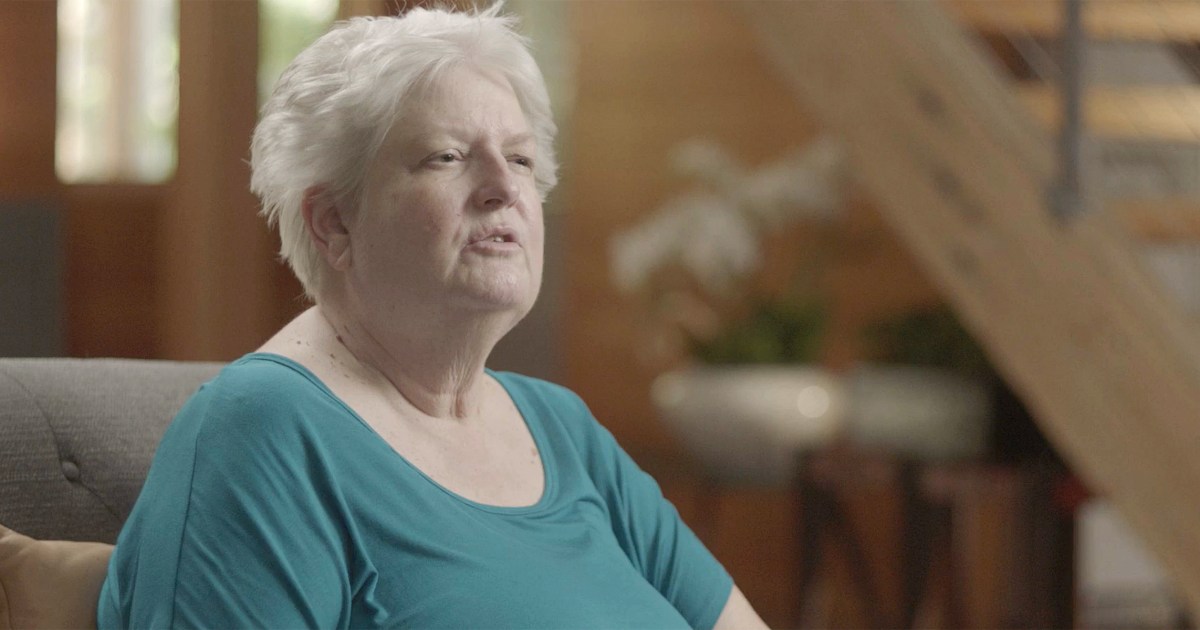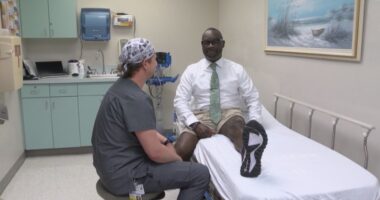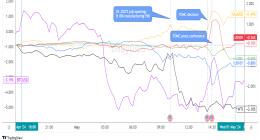
WASHINGTON — Five years after U.S. diplomats and spies in Cuba started hearing unexplained sounds and getting sick, frustration over the mystery known as “Havana Syndrome” is giving way to a growing number of legal and financial battles as potential incidents spread around the globe.
In the U.S., a diplomat who reported having been injured in China is suing the State Department alleging disability discrimination. In Canada, 27 diplomats, military police and family members are suing their government for $40 million over incidents in Cuba.
Now, a former U.S. intelligence official is suing the Defense Department in connection with an overseas incident decades ago that he believes is part of the same mystery, court records obtained by NBC News show.
As the number of suspected cases grows well above 200, dozens of current and former U.S. officials are tussling with various government agencies over benefits, treatment, lost wages or formal recognition of their injuries, diplomats and other officials said in interviews.
“Fighting an Invisible Enemy: The Voices of Havana Syndrome” will stream on NBC News NOW on Friday, Dec. 24, at 4 p.m. ET. and be available on Peacock on Dec. 27.
Meanwhile, a law President Joe Biden signed in October is about to force the U.S. government to do something that’s been difficult in the past: adjudicate who among its ranks is a legitimate victim of a phenomenon — possibly a deliberate attack — that it still can’t explain.
“I would not have retired if I had not been injured,” said Cheryl Cruise, a 20-year veteran of the State Department, who said the government is still not meeting workers’ health care needs. “It’s depressing, and it’s aggravating, and I’m not the only one.”
Cruise, who was the acting ambassador’s assistant at the U.S. Embassy in Havana when the incidents there came to light in 2017, is speaking publicly for the first time as part of a new NBC News digital documentary, “Fighting an Invisible Enemy: The Voices of Havana Syndrome.”
The digital documentary explores the evolving U.S. response to unexplained incidents in which government employees serving in more than a dozen countries have reported a range of symptoms including balance and memory problems, hearing and vision changes, and concussions — sometimes following inexplicable sounds or physical sensations.
Despite years of investigation, the U.S. says it hasn’t determined a cause or a culprit, although officials from multiple U.S. national security agencies have told NBC News they suspect the incidents could be attacks using a microwave weapon, possibly by Russia.
In 2017, the State Department described the incidents as “targeted attacks,” but it now refers to them as “anomalous health incidents.” A National Academies of Science report last year found the injuries consistent with the effects of directed microwave energy.
“We know that Russia is one of the nation-states that has the technology. There are some others,” said Sen. Jeanne Shaheen, D-N.H., who has repeatedly pressed the government to take “Havana Syndrome” more seriously.
Russia and Cuba have consistently denied any involvement. Russia’s foreign ministry has dismissed allegations as “absurd” and “paranoid,” saying: “We have repeatedly stated that Russia has nothing to do with this.”
And other U.S. officials remain skeptical given a lack of firm intelligence proving who did it and how, and some have questioned whether mass hysteria may be to blame.
‘Everything kind of went black’
When Cruise, one of four original Cuba victims who spoke to NBC News for the digital documentary, arrived in Havana in 2015, the U.S. still had no formal relations with the communist-run island 90 miles south of Florida. As the Obama administration pursued a historic rapprochement with Cuba, Cruise was on hand on the summer day when the U.S. flag was raised over the newly reopened U.S. Embassy.
Cruise says it was more than a year later, when she was on the couch reading a book at home in Havana, that she heard a high-pitched buzzing sound coming from her left side. Soon came the exhaustion and later the sensation of “being pushed from the top of the head into the ground.”
“I could actually feel my brain shutting down, like it just — everything kind of went black,” Cruise said.
Cruise said that as other staffers quietly began reporting similar incidents, she went to the embassy’s security office and listened to a recording of what others had heard.
“And I’m like, ‘Wow, that’s the sound I heard,'” Cruise said. “And that was the beginning of my trying to get people to believe me.”
Doctors at the University of Pennsylvania, whom the State Department enlisted to evaluate evacuated diplomats, did believe her, diagnosing her injuries as consistent with others in the new but growing cohort of “Havana Syndrome” victims.
Cruise says she opted to retire in 2018 when her medical issues didn’t significantly improve, only to find herself excluded from additional health benefits Congress passed the next year. Now she’s struggling to find a neurologist who will treat her under workers’ compensation.
Complicating matters for those seeking benefits is the government’s reluctance to classify who is or isn’t a “confirmed case” of so-called Havana Syndrome, which still has no clear cause or diagnostic test.
Mike Beck, a former counterintelligence officer with the secretive National Security Agency, sued the Defense Department on Wednesday over its decision to classify information about whether he was hit overseas by a high-powered microwave weapon in 1996.
Beck, who later developed a rare, early-onset form of Parkinson’s disease, asserts that his situation is similar to that of the “Havana Syndrome” victims.
In 2014, as Beck was seeking workers’ compensation, the NSA released a rare public statement confirming that it had intelligence that a hostile country Beck traveled to during that time frame was linked to “a high-powered microwave system that may have the ability to weaken, intimidate, or kill an enemy over time and without leaving evidence.”
The brief, unclassified statement said the weapon “is designed to bathe a target’s living quarters in microwaves.” Which hostile country Beck was serving in remains classified.
The statement added that the NSA had no evidence that any such weapon “was or was not used against Mr. Beck,” a caveat that Beck said has prevented him from securing workers’ compensation. Beck’s lawsuit seeks to force the government to declassify more information, including an email in which he says a top NSA official concurred that his Parkinson’s was most likely work-related.
“The fact is that this mystery has its origins and answers within the Intelligence Community, and most information remains classified,” said Beck’s attorney, Mark Zaid, who also represents Cruise and other U.S. diplomats injured in Cuba and elsewhere.
“Until the classified info is pried loose, there will be little more than conspiracies and allegations dominating the discussion,” he said in a statement.
The NSA declined to comment on any intelligence associating a hostile country with a microwave weapon. But the NSA said in a statement the U.S. intelligence community takes the incidents “very seriously” and added: “The NSA remains unwavering in its commitment to ensuring the health and wellbeing of the NSA workforce.”
Kate Husband, a diplomat who was serving with her husband in Cuba when both say they heard the sound and fell ill in 2017, said: “Every time I read about a new victim or I hear about a new victim, I feel the loss. You get all these people who have so much to offer who are not going to be the same.”
Husband, who is on medical leave from the State Department, was diagnosed with nystagmus — involuntary eye movements consistent with a concussion — along with cognitive deficits and hearing loss on just one side. She said she spent nine months after her injury “trying to do my old job, little pieces of it, a few hours a day” but could never shake the extreme headaches and nausea.
“I had to go back to the department and say, ‘I think I’m broken permanently,'” she said.
Fighting for government recognition
In 2017 and 2018, the State Department said it had “medically confirmed” about two dozen cases in Cuba and one in China. Since then, potential cases have spread to every continent except Antarctica, including suspected incidents in the U.S. The government stopped providing public tallies of the number of “confirmed” cases in 2018 after confirming a single case in China..
That is expected to change early next year when a provision in the new HAVANA Act takes effect, authorizing government payments to those with brain injuries. The legislation gave the government six months to come up with a system to determine who is eligible and for how much, a period that expires in April.
That could portend a whole new round of lawsuits from some of the hundreds of government workers who have reported suspected incidents, many of which U.S. officials have said privately they believe are not bona fide cases.
“Could You Benefit from Filing a ‘Havana Syndrome’ Energy Attack Injury Claim?” reads an advertisement from one law firm, Sullo & Sullo of Houston. “It could be in your best interests to speak to an experienced Havana Syndrome energy attack injury lawyer.”
The law firm didn’t respond to a formal inquiry asking whether it actually has any experience representing “Havana Syndrome” cases. A person who answered the phone at the firm this week said he was unaware of any current cases.
In Canada, which confirmed in 2017 that some of its diplomats and their relatives were affected in Cuba, a lawsuit against the government has been growing, adding plaintiffs who say they were injured in more recent incidents that the Canadian government hasn’t publicly disclosed – including one this year.
“We believe the Canadian government failed to take the proper steps to protect the diplomats when they knew of things that were happening in Havana,” said Paul Miller, the attorney representing the Canadians.
Global Affairs Canada, the equivalent of the State Department, said it “cannot comment on a matter that remains before the courts.” It said through a spokesman: “Since the beginning of the health incidents, the health, safety and security of our diplomatic staff and their families remains a priority.”
The circumstances may not be limited to Havana. Several diplomatic sources said Canadian diplomats have also come forward reporting suspected incidents in other countries, including some in Europe and some posted to the Canadian Embassy in Washington, which has not been previously reported.
And in October, Canadian diplomats got an alert from headquarters in Ottawa acknowledging concerns “among Government of Canada employees around the world” and urging them to report any incidents of head pressure accompanied by symptoms like disorientation, headache and cognitive defects.
“Please be assured that every report will be taken seriously,” says the email, obtained by NBC News, which also says diplomats can report incidents to the Royal Canadian Mounted Police.
The new litigants include a Canadian diplomat who was deployed to Havana for a high-level posting in December 2020. He said his government didn’t inform him before he arrived at the embassy that there had been new cases there since 2018, the most recent ones Canada’s government had acknowledged.
In February, two months after he arrived, he was in the bathroom one morning at his embassy-provided house, rented from the Cubans, when he felt an “acute reverberation” in his ear that left behind a ringing noise. He checked outside his home and saw nothing out of the ordinary. But later, he said, he developed headaches, exhaustion, memory problems and difficulty balancing in the dark.
The diplomat, who was evacuated to Dalhousie University in Halifax, where Canada sends its potential “Havana Syndrome” cases for treatment, said doctors found no increased brain bleeding but did find appreciable differences in brain wave activity between the left and right sides of his brain, compared to baseline testing performed in 2020. He told NBC News the Canadian government ultimately told him that it couldn’t determine whether or not he is a case. He has returned to work in another country.
“I’m not expecting any other career advancements or new postings,” he said in an interview. “Nobody wants someone who just causes problems and is not going to just shut up.”
The Canadian diplomat, like others involved in the lawsuit, spoke on condition of anonymity because of the litigation. The U.S. diplomats being identified by name in the NBC News digital documentary obtained permission from the State Department to speak publicly.
A State Department spokesman said Secretary of State Antony Blinken emphasized his concern about “Havana Syndrome” and about the health and safety of employees and relatives in recent calls with affected employees.
“As he expressed to the full workforce, the secretary stressed that we will continue to focus on keeping our people informed, seeking answers, and providing support to those affected,” the State Department said in a statement.
Many of those staffers have begun taking matters into their own hands.
Tina Onufer, one of the initial cohort affected in Cuba, has managed to continue working part-time for the State Department, although she requires special glasses for acute light sensitivity and suffers constant headaches, among other ongoing issues.
She and several others who served on the island were given the State Department’s Secretary’s Award — similar to a Purple Heart — for “injuries incurred in the line of duty in Havana, Cuba.” The framed award hangs on her wall.
Now Onufer is seeking treatment far from her Virginia home in Alaska, from a physician who she said may have found new ways to help “Havana Syndrome” sufferers.
“I don’t want to be known as a victim,” Onufer said. “In spite of what this does to us, we haven’t given up on getting better.”
Source: | This article originally belongs to Nbcnews.com









